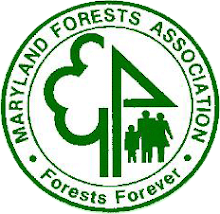Below is an Executive Summary of the SFA of 2009. The SFA bill draft and the SFA white paper are available on the MFA website by following the links above. Comments regarding the SFA of 2009 should be directed to MFA president John Foster at jfoster34@verizon.net
EXECUTIVE SUMMARY
Study after study has documented the importance of sustainable forestry to the Chesapeake Bay restoration effort and the economic underpinning of rural Maryland. But, few understand the attendant environmental and economic benefits of this resource-based industry. The Partnership for Sustainable Forestry promotes an understanding of these benefits, all of which are measurable and critical to Maryland's compliance with the 2010 goals of the Chesapeake 2000 Agreement. The envisioned Sustainable Forestry Act of 2009 is intended to help prevent further forest land conversion, estimated at 100 acres per day within the Bay watershed, by promoting forest land retention through incentives and favorable public policies in ways deemed consistent with the 2010 Chesapeake and Atlantic Coastal Bays Trust Fund and the 2007 Forest Conservation Initiative. The 2008 Interim will set the stage for the public debate during the 2009 Session.
Academic Study-related Findings and Recommendations: The Report summarizes various studies which quantify the benefits of sustainable forestry ranging from The State of the Chesapeake Forests and the Governor's Commission on Protecting the Chesapeake Bay through Sustainable Forestry to the Governor's Climate Change Commission.
Sustainable Forestry Act of 2009: Specific provisions of the proposed Act are briefly noted below.
- Preamble: Explains the intent and purpose of the Act in plain English.
- Declaration of Policy: Makes clear legislative understanding of the environmental and economic importance of sustainable forestry within the State of Maryland.
- Local Planning and Zoning: Encourages, not mandates, local governments to promote forestry through local planning and zoning practices that are not more restrictive than existing State policies.
- Promotes Landowner Outreach Efforts: Only 1 in 4 forest landowners in Maryland have adopted a Forest Stewardship Plan. The proposal would help underwrite such outreach efforts by Maryland's forest conservancy district boards in ways comparable to Maryland's agricultural boards under MALPF.
- Removes Funding Cap on the Woodland Incentives Fund: The current $200,000 cap on monies credited to the Woodland Incentives Fund, realized from the conversion of woodland to development via the agricultural transfer tax, would be repealed, meaning WIF would receive 100% of these proceeds.
- Funding for Forestry Activities under WIF Expanded: WIF is Maryland's only forestry-related funding program; there are no other subsidies for forestry. The bill delineates new efforts to promote forestry.
- Program Open Space and Rural Legacy Programs: Defines and allows "working landscapes" to be eligible for easement acquisition comparable to MALPF.
- Renames MALPF: Changes the title of MALPF to the "Maryland Agricultural and Forestry Land Preservation Foundation" consistent with the intent of current law (Section 2-501, Agriculture Article).
- Financial Incentives: (1) up to a $500 income tax credit for the development of Forest Stewardship Plans; (2) exemptions from the sales tax for the purchase of forestry equipment; (3) provides an exemption from the property tax for certain forestry products and commodities; (4) exempts forestry equipment used for manufacturing from property tax; (4) provides a 15-year State property tax exemption for forest lands protected under an easement, but subject to an approved Forest Stewardship Plan; and (5) increases the agricultural transfer tax to 7.5% on the conversion of 5 plus acres of woodland to development, meaning more funding for WIF.
- Nuisance Suit Protection against Forestry Operations: strengthens the protection of forestry operations from nuisance suits under existing law.
- Expression of Legislative Intent: Several uncodified sections are set forth to promote forestry from a renewable energy perspective to a modernization of the sediment and erosion control law.




No comments:
Post a Comment